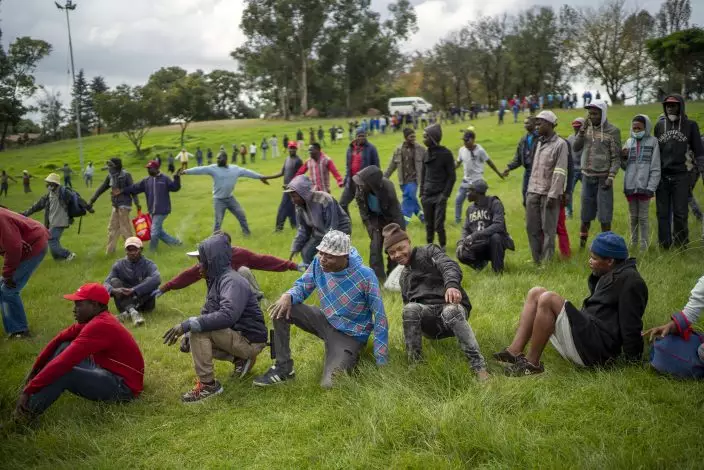South African President Cyril Ramaphosa on Thursday extended the country's strict lockdown to combat the coronavirus until the end of April.
In a speech broadcast to the nation, Ramaphosa said the lockdown of Africa's most industrialized economy, which has been in effect since March 27, has succeeded in reducing the country's average daily increase of new COVID-19 cases from 42% to about 4%.
“We must proceed in a manner that is cautious,” Ramaphosa said. “If we end the lockdown too soon or too abruptly, we risk a massive and uncontrollable resurgence of the disease. We risk reversing the gains we have made over the last few weeks.”

Homeless recyclers and other destitute people, some of whom said they have not eaten in three days practice limited social distancing as they lineup in a Johannesburg park, waiting to receive food baskets from private donors, Thursday, April 9, 2020. Because of South Africa's imposed lockdown to contain the spread of COVID-19, many people who don't have savings and are unable to work are not able to buy food.(AP PhotoJerome Delay)
South Africa, with 57 million people, has the most virus cases in Africa, with more than 1,900. It went into lockdown and restricted travel into the country fairly early after it first recorded the virus, a strategy adopted by several other countries on the continent.
South Africa's police and military have been maintaining the lockdown, especially in the large, poor townships and informal settlements on the outskirts of Johannesburg, Cape Town, Durban, Pretoria and other large cities. The measures order all but essential workers to stay at home and sales of alcohol and cigarettes are banned.
Ramaphosa said his government will increase testing for the virus to identify hotspots of infection and would offer isolation facilities for people who test positive but cannot quarantine themselves in crowded living conditions. He said human rights would be respected at all times, addressing the concerns of activists who warn that enforced isolations will be open to abuse.
In response to the global shortage of medical supplies, including protective gear and ventilators, South Africa's industrial sector will be offered incentives to ramp up production of those products, he said. And cell phone networks will be used to reach those who have been in contact with people found to be positive for the virus.
Ramaphosa also announced several economic measures including support to those who lose employment due to the lockdown. He said he and his Cabinet will cut their salaries by 30% for three months, with the money to be donated to the national fund to support the poor.
The extension of the lockdown was not unexpected based on the need to increase testing to find out where the virus has spread, said political analyst Karima Brown.
“Even though the economy is in trouble, it was a decision taken after consultation with other social partners, so that shows you the seriousness of it,” Brown said.
A leader of the Democratic Alliance opposition party, Alan Winde, welcomed the extension but urged the government to implement measures to limit job losses caused by the restrictions.
“We all want the economy to come back to life, we want people to return to work, we want our children to go back to school, and we all want to be able to move freely again,” said Ramaphosa. “But our immediate priority must remain to slow down the spread of the virus and to prevent a massive loss of life. We must do this while preventing our economy from collapsing and saving our people from hunger. We are determined to pursue a path that both saves lives and protects livelihoods.”


